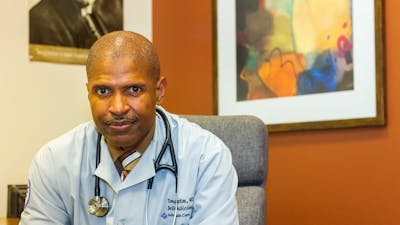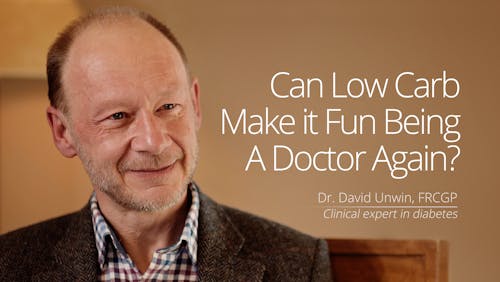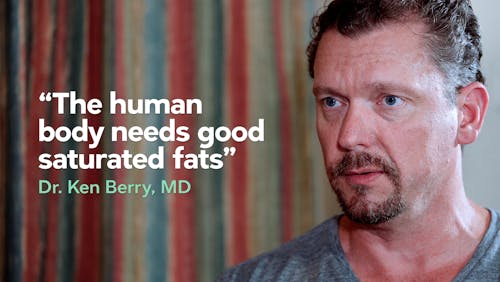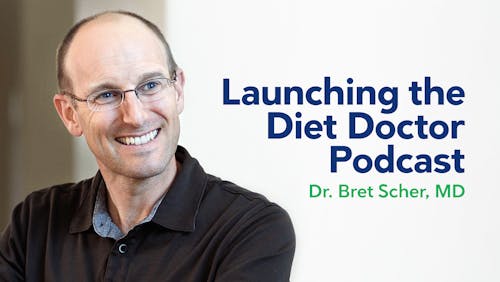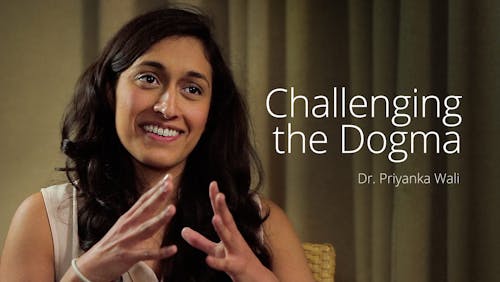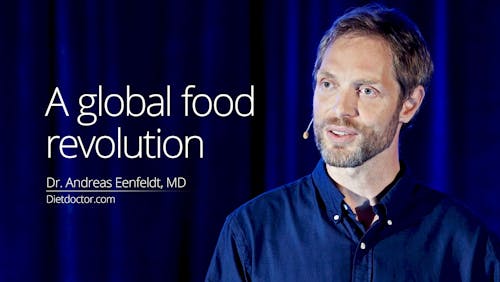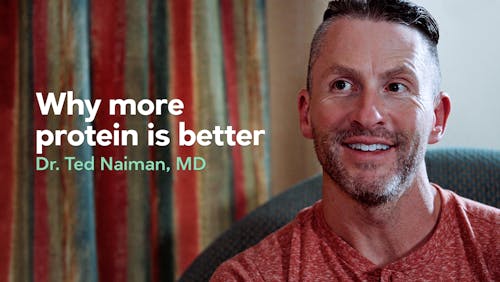Dr. Hampton: Good bugs and how they help us
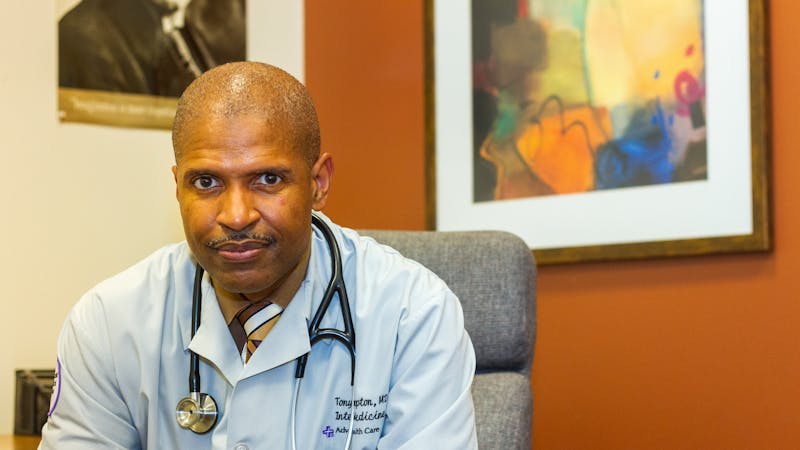
Photo: Spencer Bibbs
Dr. Tony Hampton is a family physician on the South Side of Chicago. He is writing a monthly column for Diet Doctor. This is his 13th column.
At least, that’s what a burgeoning area of research into the microbiome suggests. The microbiome is the wide array of tiny microscopic organisms, or microbes, that inhabit our bodies. They are the single-celled bacteria, viruses, fungi, and other microorganisms that live in our mouths and noses, on our skin, and inside our digestive tract.
Research shows there are more than ten times as many microbes in our body as there are human cells. There are literally trillions of them. And now we know that the majority actually help us.In my R.O.P.E. acronym, the “O” stands for organisms. In a previous column , I talked about harmful organisms — in other words, what you need to know about the bad bugs, also called pathogens, that can cause illness and disease.
(For those of you who are reading my column for the first time, I have two acronyms I use with my patients to help them focus on the things that can make them healthier. The first is “Protect your N.E.S.T.” in which the letters stand for Nutrition, Exercise, Sleep/Stress, and Thoughts/Trauma. The second is “Use your R.O.P.E. to get to your N.E.S.T.” The letters for R.O.P.E. are Relationships, Organisms, Pollutants, and Emotions.)
In this column, I’ll focus on helpful organisms, especially the growing research around good bugs and their essential roles in our bodily functions.
Many of these helpful microbes manufacture vitamins, extract nutrients from food, assist in healthy immune system function, keep our guts healthy and calm, and communicate with our brains. They may even help with weight control and metabolism.
If we don’t consider all the various factors that affect our good bugs, we may miss the opportunity to have a more ideal microbiome — and more resilient, balanced health.
From germ theory to gene theory
To understand how revolutionary the new world of the healthy microbiome is, it helps to look back over the past 150 years when the “germ theory” of disease emerged. This came about from the ground-breaking work of scientists like Louis Pasteur, Ignaz Semmelweis, and more.
The modern era of medicine began with their discoveries of the various nasty bacteria and viruses that were behind many of the most dangerous and deadly diseases. These were diseases that killed millions like childbed fever, tuberculosis, cholera, typhoid, bubonic plague, smallpox, polio, and more.
That understanding the role of pathogens in disease led to improved sanitation and hygiene, hospital infection control, public health policies, vaccinations, and the development of antibiotic drugs that treated infections from previously deadly bacteria.
It also led to many of us obsessively cleaning and killing off any and all “germs.”
But then, 20 years ago, we started realizing that some of those microbes we were obliterating were beneficial to our health and doing some essential roles for us. That realization emerged when we finally decoded the human genome.
Scientists on the Human Genome Project expected that humans would have close to 100,000 genes, but instead made an astonishing discovery: Our bodies contained about 23,000 genes, only a few thousand more than a lowly nematode worm. Where were the missing genes? Uh-oh, they were in the organisms of our microbiome — encoding the proteins that we need to survive.
This realization has led to an explosion of research around the healthy human microbiome. While there is still so much to learn, thousands of research papers have been published in the last decade that illustrate how essential a healthy microbiome is to our health.
Here’s an excellent review of this burgeoning research area, covering what we know and what we don’t.
Microbiome and gut health
I am personally interested in the role of a healthy microbiome in gut health.
I previously suffered from irritable bowel syndrome (IBS), but I have had great relief from its symptoms by adopting a low-carb diet. I believe that reducing sugar and starches in my diet likely changed the composition of my gut microbiome and reduced my intestinal sensitivity and inflammation.
Diet Doctor has many other anecdotal stories of people who saw their IBS improve on low carb.
There could certainly be a link between diet and microbial diversity. Researchers have found that patients with IBS and inflammatory bowel disease have lower bacterial diversity in their intestines.Additionally, a number of randomized control trials have found that taking probiotics (healthy bacteria) can improve IBS symptoms (although not all studies agree).
Additionally, systematic reviews have also found that diarrhea associated with the use of antibiotics can be improved by supplementing with healthy bacteria in the form of probiotics.
Here’s a recent review of how a ketogenic diet may impact your gut microbiome.
Obesity and the microbiome
Could the composition and diversity of the organisms in our microbiome have a link to obesity?
A growing body of research is saying “yes.” Several studies have described a strong correlation between diet, weight loss, and gut microbiota composition. A number of studies report that the composition of the gut microbiota differs in obese and lean subjects, suggesting that an imbalance of microbes can contribute to changes in body weight.
Does that mean, however, that taking probiotics could help with weight loss? A 2021 systematic review and meta-analysis noted a positive “trend,” but stated that much more research is needed.
In the meantime, it is likely better to simply focus on eating healthy, no-sugar, low-carb, or ketogenic foods, knowing that not only is your own body, but your microbiome, likely benefiting from this way of eating.
Summing up
I could write thousands of words about this exploding area of research, including the microbiome’s role in brain health including psychiatric disorders, skin health (such as eczema, psoriasis, and acne), and other chronic health conditions.
I highly recommend exploring the growing literature, including this excellent and fascinating bestselling book, I Contain Multitudes , by award-winning science writer Ed Yong.
As Yong notes, we are not yet at the stage where we can recommend specific probiotic replacements to alter or amend our teeming trillions of microbes to make them, and us, healthier.
We will likely get there in the near future with personalized medicine that will include recommendations to maximize the health of your specific microbiome.
But in the meantime, know that you are made up of your own human cells and trillions of non-human microbes that live within you. Whatever you do impacts them both. This includes the food you eat, your sleep, exercise, and stress; the cleaning chemicals or other toxins you are exposed to; the drugs you take, your genes, as well as other physical and environmental factors.
Try to be good to your good bugs.
Until next time, remember to protect your N.E.S.T.!
